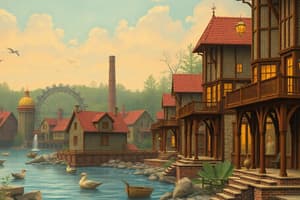Podcast
Questions and Answers
Which natural resource was essential for powering steam engines, furnaces, and factories in Britain?
Which natural resource was essential for powering steam engines, furnaces, and factories in Britain?
- Coal (correct)
- Iron ore
- Tin and copper
- Limestone and clay
What was the primary use of Britain's tin and copper deposits?
What was the primary use of Britain's tin and copper deposits?
- Production of textiles
- Generation of electricity
- Manufacturing of machinery and equipment (correct)
- Construction of buildings and infrastructure
How did Britain's rivers and streams contribute to its industrialization?
How did Britain's rivers and streams contribute to its industrialization?
- By providing water power for early textile mills (correct)
- By providing a source of iron ore
- By generating electricity through hydroelectric power
- By supporting the transportation of goods
What was the primary benefit of having an abundance of natural resources in Britain?
What was the primary benefit of having an abundance of natural resources in Britain?
What was the role of water wheels in Britain's industrialization?
What was the role of water wheels in Britain's industrialization?
How was mechanical power transmitted to nearby mills, factories, or workshops?
How was mechanical power transmitted to nearby mills, factories, or workshops?
What was the significance of Britain's limestone and clay deposits?
What was the significance of Britain's limestone and clay deposits?
What was the outcome of Britain having an abundance of natural resources?
What was the outcome of Britain having an abundance of natural resources?
What type of machines were driven by the transmitted power?
What type of machines were driven by the transmitted power?
What was the main advantage of water power in areas where coal was scarce?
What was the main advantage of water power in areas where coal was scarce?
What was the role of waterways in Britain's industrialization?
What was the role of waterways in Britain's industrialization?
What type of goods were transported from factories to markets and ports?
What type of goods were transported from factories to markets and ports?
What was the primary use of the River Thames during the Industrial Revolution?
What was the primary use of the River Thames during the Industrial Revolution?
What was the role of the canal network in Britain's industrialization?
What was the role of the canal network in Britain's industrialization?
What type of goods were transported along the coast of Britain?
What type of goods were transported along the coast of Britain?
Why was water transportation efficient during the Industrial Revolution?
Why was water transportation efficient during the Industrial Revolution?
Flashcards are hidden until you start studying
Study Notes
Natural Resources and Industrialization
- Britain's abundance of natural resources, including coal, iron ore, tin, copper, water power, limestone, and clay, fueled its industrialization.
- These resources provided energy sources, supported metal production, enabled transportation, and supplied raw materials for construction and manufacturing.
Coal and its Significance
- Britain had vast coal reserves, particularly in the Midlands, North England, and Wales.
- Coal was essential for powering steam engines, furnaces, and factories.
Iron Ore and its Importance
- Britain had significant iron ore deposits, used to produce iron and steel for machinery, tools, and construction.
Tin and Copper
- Britain had significant deposits of tin and copper, used in bronze and other alloys for machinery and equipment.
Water Power and Industrialization
- Water power played a crucial role in Britain's industrialization, providing a reliable and consistent source of energy.
- Water power was used to drive various machines, such as textile machinery, grinding mills, bellows, and sawmills.
Mechanism of Water Power
- Water wheels, installed in rivers or streams, converted the kinetic energy of water into mechanical power.
- Mechanical power was transmitted to nearby mills, factories, or workshops through a system of wooden or metal shafts, belts, and pulleys.
Importance of Water Transportation
- Britain's waterways, including rivers, canals, and coastal routes, played a vital role in transporting goods and materials during the Industrial Revolution.
- Waterways transported raw materials, finished goods, bulk goods, fuel, and people.
Notable Waterways
- River Thames: connected London to the North Sea and was a major transportation route.
- River Tyne: served the northeast region, transporting coal and goods.
- River Mersey: connected Liverpool to the Irish Sea, facilitating trade with Ireland and beyond.
- Canal network: Britain's extensive canal network, including the Bridgewater Canal and the Leeds-Liverpool Canal, linked major industrial centers.
Studying That Suits You
Use AI to generate personalized quizzes and flashcards to suit your learning preferences.





